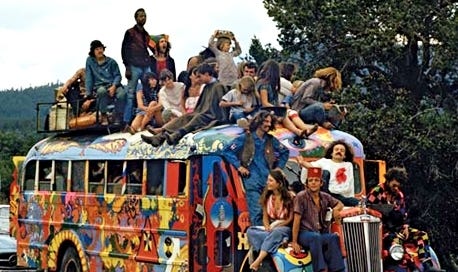I wasn’t the first person in my family to run off to San Francisco to join a movement of fringe countercultural weirdos that later somehow found itself at the vanguard of American elite culture. San Francisco today is known for a mishmash of movements that overlap with and support each other, for social scenes and group houses that are incredibly insular and sometimes verge on outright cults, for great teachers and their devoted followings, for free love and libertinism justified with a veneer of revolutionary radicalism, for thinkers and authors who lack the formal markers of prestige but nevertheless end up writing the thoughts that everyone else repeats five years later, and generally being the petri dish where new cultural mutations grow and spread from. And that’s all true. But it’s not new. My parents’ generation was dealing with a lot of the same stuff.
So my mom went to San Francisco back in hippie times. She almost never talks about it these days but she was deep in it. She was an early activist for a new-wave radical movement, she was an adherent of one of the self-development psychology I-swear-we’re-not-a-cult groups, the works. It was a great time, lots of her closest friends are from that period and she’s gone far in the career she established there. Later on she settled down in Boston with the white picket fence and all, and her movement’s political program was enshrined in U.S. federal law and bureaucracy. So it goes.
Then when I was 25 years old I told my parents I was moving to San Francisco to join a new-wave radical movement and a self-development psychology I-swear-we’re-not-a-cult group. And she sat me down and gave me three things to check before I went:
1. Are the members of the group in contact with their families?
2. How does the group react when members are close with friends who don’t share the group’s beliefs and ideology? Is this discouraged? Is it seen as normal and healthy?
3. How does the group relate to former members who have left? Are they old friends who are welcome at parties, or are they vile traitors, or what?
In my experience this is the best and fastest way to tell the difference between benign cults which will give you valuable insights and comrades in a way you can’t get anywhere else and so make you better at navigating the outside world, vs malignant cults which will fuck up your ability to interact with the world outside the cult itself. Both types of cults are real. No simple checklist is perfect, and you should stay away from any group that smells wrong even if it passes your explicit tests, but I’ve found it very useful.
Anyway I ran her checks and the groups all passed with flying colors, so I went ahead and moved to San Francisco. That was a decade ago and I’ve been having a great time. I’ve been part of three or four I-swear-we’re-not-a-cult groups, depending on how you count. Every time I’ve run my mom’s checks and joined only the ones that passed, and every time it’s turned out well for me. I’ve still got some good friends who remain deep in the I-swear-we’re-not-a-cult groups which I’ve left or passed through, and they’re doing well. In the course of things I ran into some other groups which didn’t pass these checks, or which set off my spider sense for other reasons, so I made sure to steer clear. That’s saved my ass a few times. To my surprise, in the past decade it seems like some *primarily online* movements are now also starting to fail these checks, so I guess keep an eye open there too.
So remember, always listen to your mother. Or if that fails, listen to my mother. She knows what she’s talking about.
Follow Ben Landau-Taylor on Twitter: https://twitter.com/benlandautaylor




A cult is just a toxic relationship with a room full of people
I would kill for a title like that